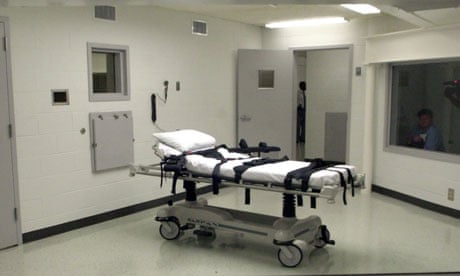An Oklahoma man who was put to death Tuesday evening despite claims that he was insane spent his final moments rambling about the presidential election and appeared startled when a prison official announced the start of the execution.
Garry Thomas Allen, 56, was executed for the 1986 killing of his fiancée, 24-year-old Lawanna Gail Titsworth, outside an Oklahoma City day-care center. His attorneys had argued that Allen should not be put to death because he could not understand the judgment against him.
Allen appeared confused moments after prison officials lifted a curtain separating the death chamber from witnesses. Slurring his words, Allen spoke for two minutes in an address that mentioned Barack Obama and Mitt Romney. His execution was held at 6pm Tuesday, one hour before polls closed in Oklahoma.
"Obama won two out of three counties," Allen said. "It's going to be a very close race."
At 6:02pm, a prison official announced that the execution was about to begin.
"What? Huh?" Allen said.
When the drugs began to flow, Allen grunted several times and wiggled his feet. He was pronounced dead at 6:10pm.
Titsworth had moved out of the home she shared with Allen and their two sons four days before her death. Allen confronted Titsworth and shot her twice in the chest. She ran with a center employee toward the building, but Allen pushed the worker away, shoved Titsworth down some steps and shot her twice more in the back, according to court records.
Titsworth's sister-in-law, Susan Titsworth, issued a statement after the execution, on behalf of the family.
"Our beloved Gail, daughter, sister and mother of two young boys, was taken from our family tragically and senselessly due to domestic violence," the statement said. "For over 25 years, we have waited for justice to be served and for this sentence to be carried out. We are thankful to close the book on this chapter today but we will never stop grieving the loss of Gail."
A police officer responding to a 911 call tussled with Allen before shooting him in the face, according to court documents. Allen was hospitalized for about two months with injuries to his face, left eye and brain. He entered a blind guilty plea to first-degree murder, meaning he had not reached a plea deal with prosecutors and did not know what the sentence would be. A judge sentenced him to die.
Allen's attorneys argued he was not competent enough to enter the plea. They also contended he was mentally impaired when he killed Titsworth, that he had been self-medicating for a mental illness and that his mental condition became worse on death row. The US constitution forbids the execution of inmates who are insane or mentally incompetent.
A judge halted Allen's original execution, on 19 May 2005, after a psychological examination at the prison indicated that Allen had mental problems. Three years later, a jury rejected Allen's claim that he should not be put to death. The Oklahoma Pardon and Parole Board had voted in April 2005 to recommend that Allen's death sentence be commuted to life without parole. That clemency recommendation was not acted on until this year, when Republican governor Mary Fallin denied it.

Comments (…)
Sign in or create your Guardian account to join the discussion